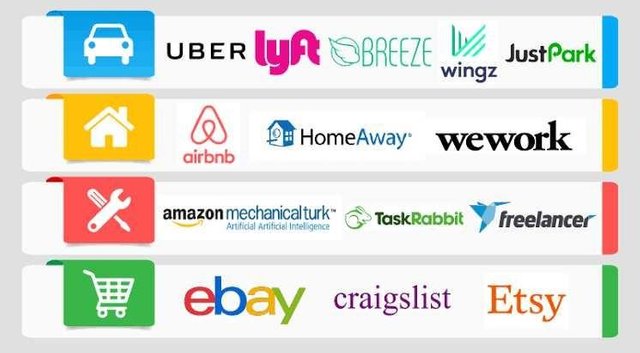The sharing economy is a little like online shopping, which started in America 15 years ago. At first, people were worried about security. But having made a successful purchase from, say, Amazon, they felt safe buying elsewhere. Similarly, using Airbnb or a car-hire service for the first time encourages people to try other offerings. Next, consider eBay. Having started out as a peer-to-peer marketplace, it is now dominated by professional "power sellers" (many of whom started out as ordinary eBay users). The same may happen with the sharing economy, which also provides new opportunities for enterprise. Some people have bought cars solely to rent them out, for example. Incumbents are getting involved too. Avis, a car-hire firm, has a share in a sharing rival. So do GM and Daimler, two carmakers.
In the future, companies may develop hybrid models, listing excess capacity (whether vehicles, equipment or office space) on peer-to-peer rental sites. In the past, new ways of doing things online have not displaced the old ways entirely. But they have often changed them.
Just as internet shopping forced Walmart and Tesco to adapt, so online sharing will shake up transport, tourism, equipment-hire and more. 
The thing which bothers me most is regulatory uncertainty. Will room-4-renters be subject to hotel taxes, for example? In Amsterdam officials are using Airbnb listings to track down unlicensed hotels. In some American cities, peer-to-peer taxi services have been banned after lobbying by traditional taxi firms. The danger is that although some rules need to be updated to protect consumers from harm, incumbents will try to destroy competition. People who rent out rooms should pay tax, of course, but they should not be regulated like a RitzCarlton hotel.
The lighter rules that typically govern bed-and-breakfasts are more than adequate. The sharing economy is the latest example of the intemet’s value to consumers. This emerging model is new big and disruptive enough for regulators and companies to have woken up to it. That is a sign of its immense potential. It is time to start caring about sharing.
Hi! I am a robot. I just upvoted you! I found similar content that readers might be interested in:
https://www.economist.com/leaders/2013/03/09/the-rise-of-the-sharing-economy
Downvoting a post can decrease pending rewards and make it less visible. Common reasons:
Submit
Welcome distortion!
eSteem is the application that improves your experience here. We have Mobile application for Android and iOS users. We also have developed Surfer Desktop application that helps you to gain new followers and stay connected with your friends, unique features - notifications, bookmarks, favorites, drafts, and more.
We reward our users with encouragement upvotes as well as monthly giveaways rewarding Spotlight top users and active Discord users.
Learn more: https://esteem.app
Join our discord: https://discord.gg/8eHupPq
Downvoting a post can decrease pending rewards and make it less visible. Common reasons:
Submit
Welcome to steemit @distortion.
Welcome the new steemians. Have a great day!
Downvoting a post can decrease pending rewards and make it less visible. Common reasons:
Submit